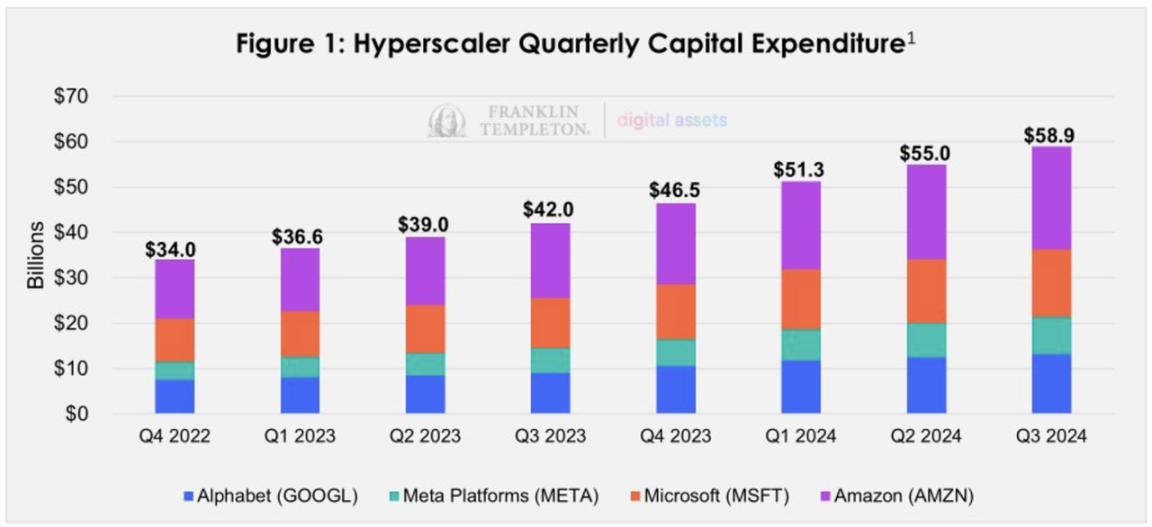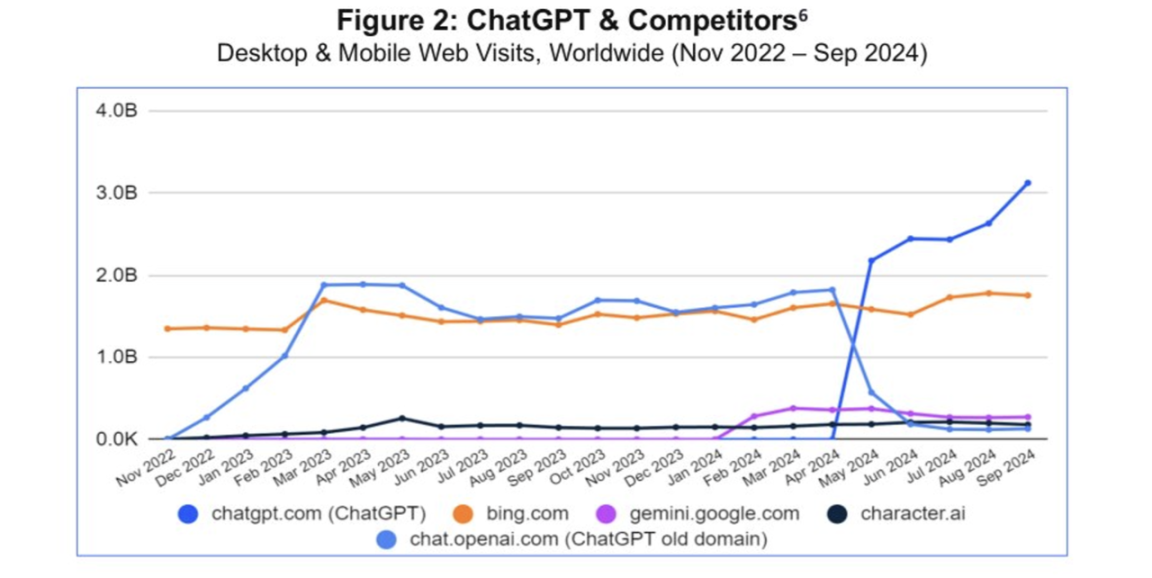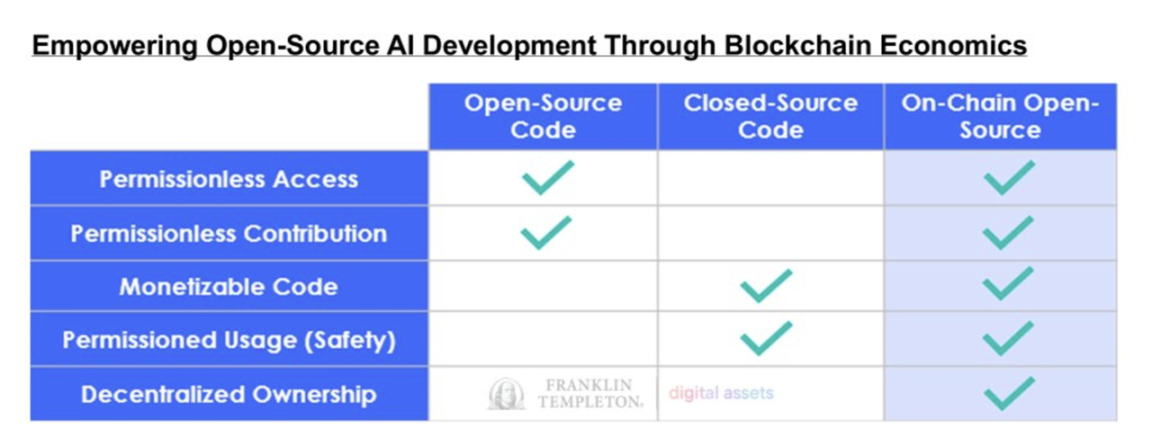By leveraging blockchain technology to add an economic layer to open-source AI code, developers around the world can compete in a more equitable competitive environment.
Written by: Franklin Templeton Digital Assets
Compiled by: Alex Liu, Foresight News

Artificial Intelligence (AI) will reinvent the internet experience and the broader economy. The foundational AI models driving this revolution may be closed-source and owned by a few entities; or they could be open-source and owned by thousands or millions. Which option ultimately prevails will have significant implications for how value is created and distributed in the AI-driven global economy.
Centralized vs Decentralized AI Infrastructure
Due to the high costs of training foundational models, the current AI landscape is dominated by a few major players. Hyperscale companies—those operating large data centers and capable of rapidly scaling infrastructure—are leading this trend. These companies, including Alphabet, Meta, Microsoft, and Amazon (the top tech companies by market capitalization), spend billions of dollars each quarter to establish and maintain their leadership in the field (as shown in Figure 1). This level of investment by a few participants creates extremely high barriers to entry, which may lead to challenges such as monopolistic pricing power, lack of transparency, and biased outputs.

In contrast, decentralized ownership and governance provide solutions to these issues. By utilizing crowd-sourced computing, decentralized AI enables different developers and owners to train models, fostering an inclusive ecosystem with fairer value acquisition. This approach can mitigate monopolistic tendencies, promote competitive innovation, and lower barriers to entry. Open-source models further enhance transparency, helping consumers understand the logic of AI, thereby building trust and facilitating regulatory oversight.
Centralized AI Case Study: OpenAI
Top hyperscale companies have become the most significant competitors in the AI arms race, with OpenAI being a leading player in this contest. This case study explores OpenAI's journey as a pioneer in the AI industry and examines the ethical dilemmas associated with its rising influence and market dominance.
As the developer of ChatGPT, OpenAI has established a significant lead in this emerging field. Notably, ChatGPT reached the milestone of 1 million users just five days after its launch. By November 2024, the platform's weekly active user count had expanded to over 200 million, doubling from November 2023. In October 2024, ChatGPT attracted over 3.7 billion visits, far exceeding the total of all other competitors combined. OpenAI is projected to generate $3.7 billion in revenue in 2024 and $11.6 billion in 2025. These figures not only highlight the rapid growth of ChatGPT but also underscore the widening gap between OpenAI and its competitors (as shown in Figure 2).

OpenAI was initially founded in 2015 as a non-profit AI research organization committed to an open-source approach, promising to freely share its research, code, and data. However, in 2019, OpenAI shifted to a "profit cap" model. In June 2020, OpenAI released GPT-3 as a closed-source model (GPT-3.5 and later versions are also closed-source). In September 2024, reports indicated that OpenAI would no longer be overseen by a non-profit board as it sought to transition to a traditional for-profit company. Critics emphasize that OpenAI is straying from its founding mission to develop safe general AI for the benefit of humanity, as well as its initial emphasis on transparency and preventing the concentration of power.
OpenAI's closed-source choice has been emulated by other leading foundational models, including Google Gemini, Claude AI, and Perplexity, with only Meta's LLaMa offering an open-source alternative.
While the shift to closed systems was initially driven by concerns over misuse and safety, it has also raised significant questions about accessibility, transparency, and the broader ethical implications of closed-source models owned by a few centralized entities driving the internet.
Empowering Open-Source AI Development through Blockchain Economics

The early dominance of leading companies like OpenAI, Microsoft, Alphabet, and Amazon in AI foundational model development is concentrating control and economic benefits of the most transformative technology in a few organizations. By leveraging blockchain technology to add an economic layer to open-source AI code, developers around the world can compete in a more equitable competitive environment. This novel approach enables open-source contributors to monetize their models, data, and innovations—for the first time combining the collaborative advantages of open-source development with the monetization and security benefits typically associated with closed-source code.
In addition to facilitating the monetization of open-source code, blockchain-based decentralized protocols also allow individual developers and small organizations to crowdsource critical data and computing resources. Without these resources, many developers would be hindered before they even begin their efforts. However, if developers from around the world can access the necessary data and computing resources, they will undoubtedly create work that complements the innovations produced by hyperscale companies.
In summary, blockchain-based AI development coordination protocols enable developers to benefit from open collaboration and resource sharing while enjoying the ability to monetize their contributions and ensure the security and integrity of their work through cryptographic security. Individual developers and small organizations can meaningfully participate in the advancement of AI, gain economic incentives, retain ownership, and ultimately become significant stakeholders in the AI internet.
Conclusion
By unleashing the potential of millions to contribute to AI in an open and economic manner, blockchain-supported platforms have the potential to shape the generation and distribution of value in the emerging AI-native internet. In addition to promoting collaboration, monetization, and the sharing of critical data and computing resources, these protocols also support community governance, ensuring that decisions regarding AI development, use, and safety are made collectively. This paradigm shift could lead to a more diverse, equitable, and innovative economy.
免责声明:本文章仅代表作者个人观点,不代表本平台的立场和观点。本文章仅供信息分享,不构成对任何人的任何投资建议。用户与作者之间的任何争议,与本平台无关。如网页中刊载的文章或图片涉及侵权,请提供相关的权利证明和身份证明发送邮件到support@aicoin.com,本平台相关工作人员将会进行核查。



